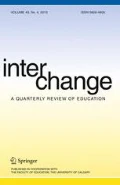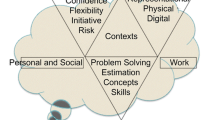Abstract
This paper, written by a practicing school teacher, offers a background and rationale to explain how his educational constructs of learning have been challenged, influenced, and changed by exposure to constructivist educational philosophy, to frame the tensions he encounters in his practice as a result of questioning educational beliefs in a technocratic school system, and finally, to discuss the resulting consequences this process has for his teaching. In addition, the author hopes to encourage dialogue between practitioners and scholars about the ways recent constructivist conceptions of education, teaching, and learning, although theoretically appealing, can be difficult to place into practice in a technocratic school system.
Similar content being viewed by others
REFERENCES
Association of Teacher Educators. (1993). 21st Century: Restructuring the education of teachers. Reston, VA: Association of Teacher. Educators.
Berthoff, A. (1990). The sense of learning. Portsmouth, NH: Boynton/Cook.
Bowers, C.A. (1982). The reproduction of technological consciousness: Locating the ideological foundations of a radical pedagogy. Teachers College Record, 35(4), 34–39.
Bullough, R., Knowles, G., & Crow, N. (1990). Emerging as a teacher. New York: Routledge.
Burke, J. (1990). Connections. Boston, MA: Little, Brown and Company.
Burris, B.H. & Heydebrand, W.V. (1988). Educational control in the United States. New Directions for Higher Education No. 35 (Management Science Applications to Academic Administration), 9(3), 5–25.
Carnegie Task Force on Teaching as a Profession. (1986). A nation prepared: Teachers for the twenty-first century. New York: Carnegie Forum on Education and the Economy.
Coles, L.C. & Knowles, J.G. (1993). Teacher development partnership research: A focus on methods and issues. American Educational Research Journal, 30, 473–495.
Cooper, J.M. (1990). The teacher as decision maker. In J.M. Cooper (Ed.), Classroom teaching skills (pp. 57–83). Lexington, MA: D.C. Heath and Company.
Cuban L. (1984). How teachers taught: Constancy and change in American classrooms, 1890–1980. New York, NY: Longman.
Deegan, D.H. (1995). The necessity of debate: A comment on commentaries. The Reading Teacher, 48, 688–695.
Education Strategic Planning Committee. (1992). 1992–1997 Utah State public education strategic plan: A strategic guide for future development of the public school system. Salt Lake City, UT: Office of the Legislative Fiscal Analyst.
Eisner, E.W. (1991). The enlightened eye. New York: Macmillan Publishing.
Fullan, M. (1995). Change forces: Probing the depths of educational reform. New York: Falmer Press.
Fullan, M. (1985). Change processes and strategies at the local level. The Elementary School Journal, 85, 391–492.
Gage, N.L. (1994). The scientific status of research on teaching. Educational Theory, 44(4), 371–383.
Garrison, J.W. (1988). The impossibility of a theoretical educational science. Journal of Educational Thought, 22, 21–26.
Garrison, J.W. & Macmillan, C.J.B. (1988). A logical theory of teaching: Eroteticsandintentiallity. Dordrecht, NL: Kluwer Academic Publishers.
Garrison, J.W. & Macmillan, C.J.B. (1994). Process-product research on teaching: Ten years later. Educational Theory, 44(4), 385–397.
Gatto, J.T. (1992). Dumbing us down: The hidden curriculum of compulsory schooling. Philadelphia, PA: New Society Publishers.
Giroux, H.A. (1988). Critical theory and the politics of culture and voice: Rethinking the discourse of educational research. In R. Shermann & R. Webb (Eds.), Qualitative research in education: Focus and methods (pp. 110–122). New York, NY: Falmer Press.
Giroux, H.A. (1989). Critical pedagogy, the State, and cultural struggle. Albany, NY: State University of New York Press.
Goodlad, J. (1984). A place called school: Prospects for the future. New York, NY: McGraw-Hill Book Co.
Goodlad, J.I., Sirotnik, K.A. & Soder, R. (1990). The moral dimensions of teaching. San Francisco: Jossey-Bass Publishers.
Goodman, K.S. (1992), I didn't found whole language (Distinguished Educator Series). Reading Teacher, 46(3), 188–99.
Hunter, M. (1982). Mastery teaching. El Segundo CA: TIP Publications.
Illich, I.A, (1972). The alternative to schooling. In T. Hippie (Ed.), Crucial issues in contemporary education (pp. 210–233). Pacific Palisades, CA: Goodyear Publications Co.
Jacobsen, D., Eggen, P. & Kauchak, D. (1989). Methods for teaching: A skillsapproach. Columbus, OH: Merrill Publishing Company.
Jarolimek, J. & Foster, CD. (1989). Teaching and learning in the elementary school. New York, NY: Macmillan Publishing Company.
Kagan, D.M. (1992). Professional growth among preservice and beginning teachers. Review of Educational Research, 62,129–169.
Kibby, M.W. (1993). What reading teachers should know about reading proficiency in the U.S. Journal of Reading, 37, 28–39.
Kincheloe, J.L. & McLaren, P.L. (1994). Rethinking critical theory and qualitative research. In N. Denzin & Y. Lincoln (Eds.), Handbook of qualitative research (pp. 136–152). Thousand Oaks, CA: Sage Publications.
Knowles, J.G. (1994). Metaphors as windows on a personal history: A beginning teacher's experience. Teacher Education Quarterly, 21, 37–63.
Leinhardt, G. (1992). What research on learning tells us about teaching. Educational Leadership, 49, 20–25.
Lomax, P. (1991). Managing better schools and colleges: The action research way. Philadelphia, PA: Multilingual Matters.
Madison, G.B. (1988). The hermeneutics of postmodernity: Figures andthemes. Bloomington, IN: Indiana University Press.
McNiff, J. (1993). Teaching as learning: An action research approach. New York, NY: Routledge.
Miles, MB. & Ekholm, M. (1991). Will new structures stay restructured? Paper presented at the Annual Meeting of the American Educational Research Association, Chicago, IL, April.
National Commission on Excellence in Education. (1983). A nation at risk. Washington DC: U.S. Government Printing Office.
Ornstein, A.C. (1995, Winter). The new paradigm in research on teaching. The Educational Forum, 59, 24–129.
Pajeras, M.F. (1991). Teacher's beliefs and educational research: Cleaning up a messy construct. Review of Educational Research, 62, 307–332.
Peters, M.T. & Heron, T.E. (1993). When the best is not good enough: An examination of best practice. Journal of Special Education, 26, 371–385.
Phelan, A.M. & McLaughlin, H.J. (1995). Educational discourse, the nature of the child, and the practice of new teachers. Journal of Teacher Education, 46(3), 165–174.
Phillips, D.C. (1995). The many faces of constructivism. Educational Researcher, 24, 5–12.
Senge, P. (1994). The fifth discipline fieldbook: Strategies and tools for building a learning organization. New York: Doubleday.
Strauss, M.J. (1994). A constructivist dialogue. Journal of Humanistic Education and Development, 32, 183–187.
Author information
Authors and Affiliations
Rights and permissions
About this article
Cite this article
Dewitt, P. A Third Grade Teacher in a Technocratic School System Asks a Dangerous Question: What is Learning?. Interchange 30, 399–414 (1999). https://doi.org/10.1023/A:1007646828111
Issue Date:
DOI: https://doi.org/10.1023/A:1007646828111



